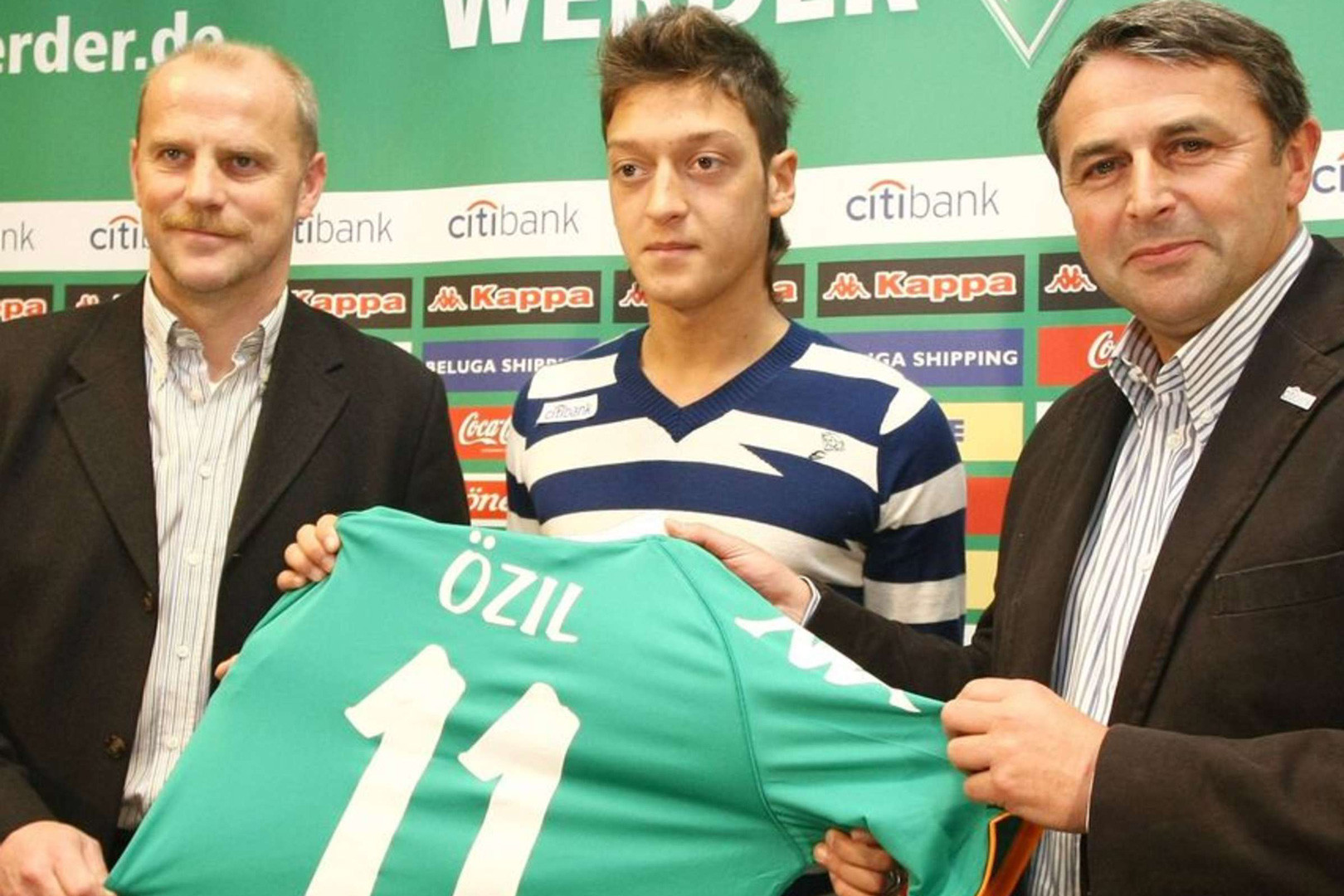Mesut Ozil’s career has been marked by numerous fluctuations, yet his zenith undeniably epitomized beautiful and graceful football.
Even amidst performance downturns, his on-field elegance remains undeniable. Born in Gelsenkirchen, a city along the Emscher River (a tributary of the Rhine River), Ozil hails from a Turkish Muslim family. He faithfully performs his pre-match prayers and showcases an artful style of football, predominantly utilizing his head and left leg.

Ozil possesses the unique ability to dismantle any defense, contorting opponents with subtle movements of his waist or ankle. For a significant period, he served as the linchpin of the German team, orchestrating attacks and disrupting opposition formations with his pinpoint final passes.
His pinnacle came during his tenure at Real Madrid, where he assumed the mantle of leadership for a German squad lacking a midfield maestro post the Michael Ballack era.
EARLY LIFE
Raised in the working-class neighborhood of Gelsenkirchen, Mesut was recruited by Schalke before he turned 17. However, after over three years, the club reluctantly parted ways with him.
Schalke accused the press of Ozil requesting a salary increase, a move perceived as a tactic to shield the club from criticism for letting go of one of its most promising talents. Additionally, at the time, the team boasted Ivan Rakitic, who was performing exceptionally well.
Werder Bremen subsequently signed Ozil, and his career continued to ascend. Joachim Low identified Mesut’s potential and included him in the German national team’s preparations for the 2010 World Cup, the first held in an African country.
Initially, questions arose regarding his defensive contributions, ball distribution, and adaptability, as he differed from his German teammates in style and approach.

On the field, Ozil epitomized the essence of beautiful football, earning recognition from experts who hailed him as one of the heirs to German football legends such as Bernd Schuster, Felix Magath, Karl-Heinz Rummenigge, Wolfgang Overath, and Franz Beckenbauer.
Transitioning from Werder Bremen to the German national team, he showcased his talent and shone brightly during the 2010 World Cup. This served as a springboard for the player born in 1988 to join Real Madrid, a club seeking stability during the second phase of Florentino Perez’s chairmanship. Following his journey in South Africa, five top clubs expressed interest in Ozil: Arsenal, Manchester United, Bayern Munich, Real Madrid, and Barcelona.
Reflecting on his decision-making process years later in his autobiography “Magic of the Game,” Ozil revealed insights into his negotiations with Barcelona and Real Madrid. “When Barca called me, I inquired why Guardiola was not involved in the negotiations,” he recalled. “They explained he was on vacation.” Ozil went on, “Guardiola did not express any explicit desire for my signing. In contrast, Mourinho made significant efforts to convince me. He was persuasive, emotionally invested, and dedicated to the negotiations. This stark contrast led me to choose Jose and Real Madrid.”

Finding success with Real Madrid under the guidance of Jose Mourinho proved beneficial for Ozil, despite his introverted nature and penchant for partying. Mourinho’s firm leadership style compelled him to work hard and run like any other player on the team.
Gradually, with a few private Spanish lessons, Ozil managed to assimilate into the social life at the Valdebebas training center, which, despite its glory, was also fraught with pressure.
Behind the football persona, Ozil is just an ordinary guy at Valdebebas; an accomplished swimmer, a skilled table tennis player, and a proficient PlayStation gamer. He is also passionate about music, particularly Turkish pop and hip-hop, often portraying the image of a devoted fan.
His three-year tenure at the Spanish giants was pivotal for Ozil. He openly admitted idolizing Zinedine Zidane, who then served as an advisor, bridging the gap between President Perez and the team. Ozil confessed, “I was especially nervous when I met Zizou.”

As a young boy, Ozil idolized Zinedine Zidane, even naming the square near his house “Affenkafig” (monkey cage) where he practiced emulating the French legend’s ball-handling skills. Through childhood exercises, he honed his abilities to replicate many of Zizou’s moves, both at Real Madrid and for the German national team.
Ozil’s legacy at the Bernabeu was not only positive in terms of football but also on a personal level. Those who interacted with him daily recall him as reserved yet amiable.
Regarding any off-field issues, the noble sector of Real Madrid attributed them to his father, Mr. Mustafa, suggesting that Mesut himself was not involved in any controversy. Jorge Valdano, Real Madrid’s former sporting director, played a key role in convincing Ozil to join the club, highlighting his talent and active participation in matches.
Reflecting on Ozil’s departure from Real Madrid, Valdano expressed regret, believing that the decision to let him go was not wise given his potential for further growth.
Valdano highly praised Ozil’s qualities, describing his natural talent and attractive, effective playing style as a bridge between technique and strength.
Notably, Cristiano Ronaldo expressed a desire to play alongside Ozil, crediting the German midfielder for creating numerous opportunities and space for him to excel. Ronaldo even acknowledged Ozil’s role in his success, stating, “Mesut helped me become the best striker.”

In his 159 appearances for “Los Merengues,” Ozil netted 27 goals and provided 80 assists, 31 of which directly contributed to Ronaldo’s scoring feats and numerous personal achievements.
Ozil’s tenure in Spain left an indelible mark, characterized by his association with beautiful football and elegance, epitomizing a distinctive rhythm that was unmistakably his own. Despite his departure to Arsenal in 2013, he remained entrenched in the minds of Madridistas as a player who exuded grace and finesse on the field.
In the realm of football, where ten men once rallied around Lionel Messi in Barcelona, Ozil was the linchpin for ten others at Real Madrid. Renowned for his tireless work rate, he covered 12-14 kilometers per match and emerged as one of Mourinho’s favorite “number 10s” throughout his coaching career.
At Real Madrid, Ozil’s dedication knew no bounds as he tirelessly ran for his teammates, finding happiness in orchestrating passes that led to goals. His style of play epitomized artistic football, a rare feat that few have replicated in the past decade.